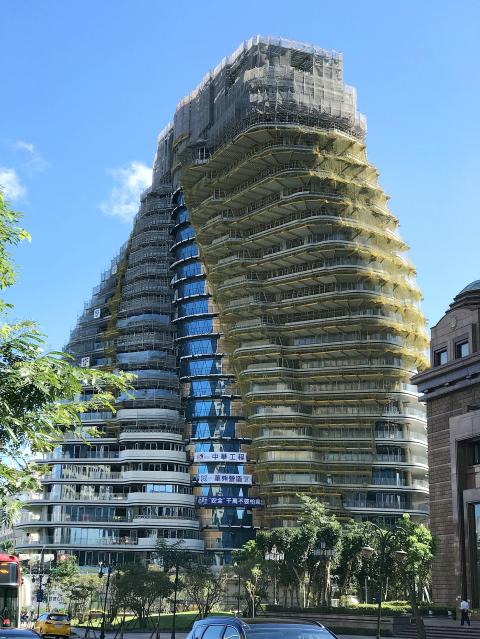BES Engineering Corp (中華工程) said it expects to obtain a use permit for a high-profile residential building in Taipei’s Xinyi District (信義) next month, which would allow it to launch a sales campaign and boost revenue in the second half of the year.
The company spent six years developing luxury home project Taozhu Garden (陶朱隱園) — reportedly Taiwan’s most expensive property selling at NT$6 million (US$199,867) per ping (3.3m2), twice the rate for apartments elsewhere in the neighborhood.
Structural engineer Chang King-le (張敬禮) on Thursday vouched for the building’s safety, telling reporters that the company used the “safest and strongest” building materials on the project, and it would survive fatal earthquakes and storms unharmed.

Photo: Hsu Yi-ping, Taipei Times
Core Pacific Group (威京集團) chairman Sheen Ching-jing (沈慶京) “gave him a free hand” in pursuing structural safety and environmental friendliness, Chang said.
Core Pacific owns BES Engineering and a dozen other businesses.
The building materials are of the same grade as those used for Taipei 101, the Tokyo Skytree, Apple Inc’s headquarters and “nuclear power plants,” Chang added.
The company has not settled on a pricing strategy for the building, but the rumored NT$6 million per ping is not far-fetched, BES spokeswoman Vivian Cheng (程安慈) said.
“Mr Sheen has allowed his son to steer the group in recent years,” Cheng said. “He would like the highest prices possible for the apartments, even though he does not like to label them luxury homes.”
The 21-story complex offers 40 extravagant apartments of about 300 ping each and elevators that are large enough to lift sports cars, luxury furniture and collections, BES said.
The company is currently attaching 23,000 plants to the facade, which could absorb 130 tonnes of carbon dioxide a year, making the complex more environmentally friendly, Cheng said.
The tower will no doubt be the most expensive residential complex in Taiwan when it comes on the market, Chinese-language Housing Monthly (住展雜誌) research manager Ho Shih-chang (何世昌) said.
The central bank has maintained credit controls on luxury housing of NT$80 million in Taipei and NT$40 million elsewhere to help stabilize the property market.
BES Engineering has NT$29 billion in civil engineering contracts on hand this year, including public construction works at Taiwan Taoyuan International Airport and the Shihmen Reservoir, and on the Taipei Mass Rapid Transit System and the Ministry of National Defense’s dormitories, Cheng said.

UNCERTAINTY: Innolux activated a stringent supply chain management mechanism, as it did during the COVID-19 pandemic, to ensure optimal inventory levels for customers Flat-panel display makers AUO Corp (友達) and Innolux Corp (群創) yesterday said that about 12 to 20 percent of their display business is at risk of potential US tariffs and that they would relocate production or shipment destinations to mitigate the levies’ effects. US tariffs would have a direct impact of US$200 million on AUO’s revenue, company chairman Paul Peng (彭雙浪) told reporters on the sidelines of the Touch Taiwan trade show in Taipei yesterday. That would make up about 12 percent of the company’s overall revenue. To cope with the tariff uncertainty, AUO plans to allocate its production to manufacturing facilities in

TAKING STOCK: A Taiwanese cookware firm in Vietnam urged customers to assess inventory or place orders early so shipments can reach the US while tariffs are paused Taiwanese businesses in Vietnam are exploring alternatives after the White House imposed a 46 percent import duty on Vietnamese goods, following US President Donald Trump’s announcement of “reciprocal” tariffs on the US’ trading partners. Lo Shih-liang (羅世良), chairman of Brico Industry Co (裕茂工業), a Taiwanese company that manufactures cast iron cookware and stove components in Vietnam, said that more than 40 percent of his business was tied to the US market, describing the constant US policy shifts as an emotional roller coaster. “I work during the day and stay up all night watching the news. I’ve been following US news until 3am

COLLABORATION: Given Taiwan’s key position in global supply chains, the US firm is discussing strategies with local partners and clients to deal with global uncertainties Advanced Micro Devices Inc (AMD) yesterday said it is meeting with local ecosystem partners, including Taiwan Semiconductor Manufacturing Co (TSMC, 台積電), to discuss strategies, including long-term manufacturing, to navigate uncertainties such as US tariffs, as Taiwan occupies an important position in global supply chains. AMD chief executive officer Lisa Su (蘇姿丰) told reporters that Taiwan is an important part of the chip designer’s ecosystem and she is discussing with partners and customers in Taiwan to forge strong collaborations on different areas during this critical period. AMD has just become the first artificial-intelligence (AI) server chip customer of TSMC to utilize its advanced

Six years ago, LVMH’s billionaire CEO Bernard Arnault and US President Donald Trump cut the blue ribbon on a factory in rural Texas that would make designer handbags for Louis Vuitton, one of the world’s best-known luxury brands. However, since the high-profile opening, the factory has faced a host of problems limiting production, 11 former Louis Vuitton employees said. The site has consistently ranked among the worst-performing for Louis Vuitton globally, “significantly” underperforming other facilities, said three former Louis Vuitton workers and a senior industry source, who cited internal rankings shared with staff. The plant’s problems — which have not